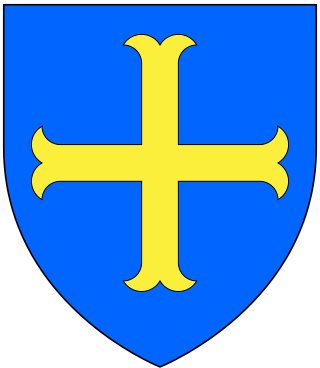
The title Marquess of Halifax was created in the Peerage of England in 1682 for the George Savile, 1st Earl of Halifax.

There have been five baronetcies created for persons with the surname Barker, three in the Baronetage of England, one in the Baronetage of Great Britain and one in the Baronetage of the United Kingdom. All five creations are extinct.

Sir John St John, 1st Baronet of Lydiard Tregoze in the English county of Wiltshire, was a Member of Parliament and prominent Royalist during the English Civil War. He was created a baronet on 22 May 1611.
Three baronetcies were created for persons with the surname D'Oyly, two in the Baronetage of England and one in the Baronetage of the United Kingdom. One creation is extant as of 2008.

The Kniveton Baronetcy, of Mercaston in the County of Derby, was a title in the Baronetage of England. It was created by King James I on 29 June 1611 for William Kniveton of Mercaston Hall, Muggington, Derbyshire. The family originated in the village of Kniveton,, from where their name derived. Branches of the family later had seats at Bradley and by virtue of the 15th century marriage of Nicholas Kniveton, at Mercaston, near Muggington, Derby
There have been three baronetcies created for persons with the surname Noel, two in the Baronetage of England and one in the Baronetage of Great Britain. One creation is extant as of 2008.

The Hoghton or Houghton, later Bold-Hoghton, later de Hoghton Baronetcy, of Hoghton Tower in the County of Lancashire, is a title in the Baronetage of England. It was created on 22 May 1611 for Richard Hoghton, Member of Parliament for Lancashire. The Hoghton family had been landowners in Lancashire since the reign of King Stephen and had been Knights of the Shire for Lancashire since the 14th century. The second Baronet represented Clitheroe and Lancashire in the House of Commons and was a Royalist leader during the Civil War. The third and fourth Baronets both sat as Members of Parliament for Lancashire. The fifth Baronet was Member of Parliament for Preston and East Looe while the sixth and seventh Baronets represented Preston. The eighth Baronet assumed the additional surname of Bold. In 1892 the ninth Baronet resumed, by Royal licence, the ancient family surname of de Hoghton.

There have been three baronetcies created for descendants of the ancient Norman family of Molyneux who were granted extensive estates in Lancashire after the Norman Conquest.
Richard Molyneux, 1st Viscount Molyneux (1594–1636) was an English politician who sat in the House of Commons at various times between 1614 and 1629.
The Tresham Baronetcy, of Rushton in the County of Northamptonsire, was a title in the Baronetage of England.
The Wortley Baronetcy, of Wortley in the County of York, was a title in the Baronetage of England. It was created on 29 June 1611 for Francis Wortley, who later sat as member of parliament for East Retford and supported the Royalist cause in the Civil War. The title became extinct on the death of the second Baronet in 1665.
There have been five baronetcies created for persons with the surname Wentworth, four in the Baronetage of England and one in the Baronetage of Great Britain. All creations are extinct.
There have been two baronetcies created for persons with the surname Mildmay, one in the Baronetage of England and one in the Baronetage of Great Britain. Both are extinct.
Sir Richard Hoghton, 3rd Baronet was an English politician who sat in the House of Commons at various times between 1640 and 1656. He supported the Parliamentary cause in the English Civil War.
The Dallison Baronetcy, of Greetwell in the County of Lincoln, was a title in the Baronetage of England. It was created in February 1644 for Robert Dallison, the son of Sir Charles Dallison, an officer in the Royalist Army during the Civil War. Sir Robert was himself a supporter of the Royalist cause. The title became extinct on the death of the fourth Baronet in circa 1720.
Sir William Ayloffe, 1st Baronet, of Braxted Magna in Essex, was knighted by James I in 1603, created a baronet in 1612 and sat as a Member of Parliament (M.P.) from 1621 to 1622.
Sir Benjamin Ayloffe, 2nd Baronet was an English landowner and politician who sat in the House of Commons from 1661 to 1662. He supported the Royalist cause in the English Civil War.
Sir William Ayloffe, 3rd Baronet was an officer in the Royalist army during the English Civil War.
Rev. Sir John Ayloffe, 5th Baronet was an English clergyman, Rector of Stanford Rivers in Essex from 1707 until 1730.
Sir Benjamin Ayloffe, 4th Baronet of Great Braxted, was a London merchant.






